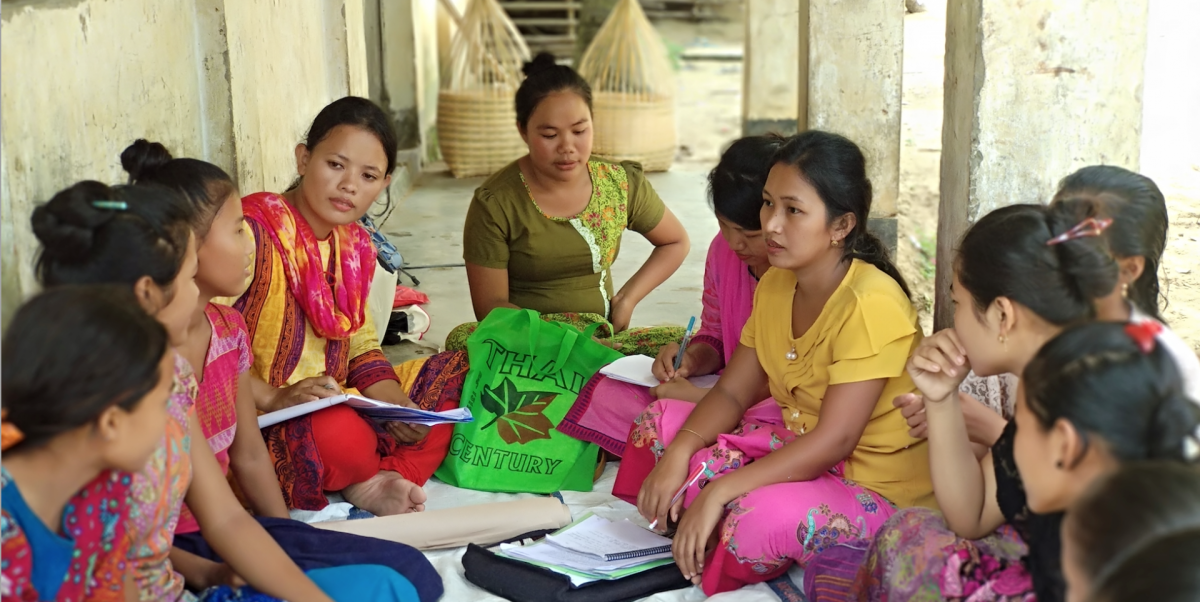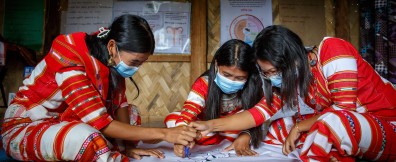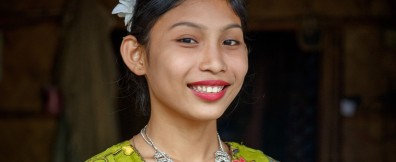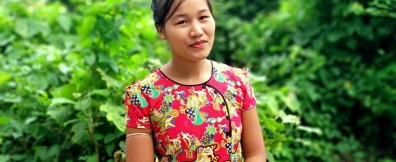Our Lives, Our Health, Our Futures
Promote gender equality and empower women and girls in an area of conflict and patriarchal social structures by working with schools and in communities.

About the programme Our Lives, Our Health, Our Futures
The forgotten conflict (1971-1997) in the isolated Chittagong Hill Tracts (CHT) area of Bangladesh gravely affects the lives of the indigenous Jummas (11 ethno-linguistically and religiously diverse people). Traditional patriarchal social structures in CHT severely disadvantage women and girls and restrict their bodily and sexual autonomy.
Together with the prolonged conflict, this increases their exposure to sexual violence and assault, making CHT highly relevant for interventions to promote gender equality and women and girls’ empowerment.
Our Lives, Our Health, Our Futures (funded by the European Union) aims to enable and support young women and adolescent girls from indigenous groups to transition into adult womanhood with dignity, and bodily and sexual autonomy, without violence, coercion and/or discrimination.
This programme is designed to holistically support the empowerment of young women and adolescent girls while also targeting key gatekeepers and service providers to foster an enabling environment.
Fact:
62% of households in the Chittagong Hill Tracts live below the absolute poverty line
On average the literacy rate of women in the Chittagong Hill Tracts is 37.8%
The women and girls in the programme are disadvantaged based on their sex, age, indigenous identity and socio-economic status as well as face regular gender-based violence from the on-going military presence
Impact of the programme
Our Lives, Our Health, Our Futures operates with two parallel tracks to provide a more holistic approach:
- Empowering and supporting girls and women
- Strengthening key Civil Society Organisations (CSO) in the Chittagong Hill Tracts (CHT)
We will target 12,000 girls and young women (ages 10-25) in smaller community centred girls clubs. These clubs are run by trained mentors. These clubs will provide a safe and fun space for the girls to gather, build community and learn more about their sexual health and reproductive rights.
To support the girls, mentors and CSOs will also work within the communities holding sessions with community and religious leaders as well as the girl’s mothers, fathers, brothers and husbands. These meetings are aimed to support the key adults that play an important role in the girls’ lives.
We have selected 10 organisations already working in the Chittagong Hill Tracts (CHT) to help implement this programme. Training and coaching will be offered including technical training on sexual health and reproductive rights, menstrual health, programme management and financial management.
Given the high level of violence in the area, we also address local service providers to support the specific needs of the girls as well as to identify and report cases of gender-based violence.
Contribution to the Sustainable Development Goals (SDGs):
- Goal 5: Gender equality - Achieve gender equality and empower all women and girls
- Goal 6: Clean water and sanitation - Ensure access to water and sanitation for all
- Goal 17: Partnerships for the goals - Strengthen the means of implementation and revitalize the global partnership for sustainable development
Approach of the programme
This programme is developed based on a women-centered approach. The aim is for each activity to support and benefit the girls and young women in the Chittagong Hill Tracts. We work with the girls directly, engage with the gatekeepers and key people in their families, build awareness and demand for safe and accommodating facilities and working to build a better Gender Based Violence response.
Simavi has partnered with local organisations who are also trained in this approach. The focus is to also uplift indigenous run organisations, women led organisations and these critical groups already working to support women and girls in the Chittagong Hill Tracts (CHT). This type of partnership will also enhance the sustainability of our work, impact and the lives of the girls in these communities.
Budget: € 5,560,000 Total (€5,000,000 max amount by EU and €560,000 own contribution Simavi), total Simavi budget: € 2,270,540, duration: 5 years, location: Bangladesh
Partners
'In the Chittagong Hill Tracts (CHT) we face lots of challenges. We are not safe due to settlers and Rohingya settlement. Ethnic women’s lives are linked to land, forest, water. But women are not safe there. Increased sexual violence and domestic violence is a problem. There is need to have more female representatives in leadership and leadership needs to be positive about women’s empowerment…we have lots of challenge from government, armed forces, so we need support from government from EU, BNPS, Simavi. Without the support from specially government we cannot advance.'
Dawnai Prue Naly, Executive Director of AKS
In-country partners

Bangladesh Nari Progati Sangha (BPNS) - Bangladesh

Hill Flower - Bangladesh

WEAVE - Bangladesh

KMKS - Bangladesh

PROGRESSIVE - Bangladesh

Taungya - Bangladesh

GRAUS (Gram Unnayon Sangathon) - Bangladesh

TAHZINGDONG - Bangladesh

TUS (Trinamul Unnayan Sangstha) - Bangladesh

Ananya Kallyan Sangathon (AKS) - Bangladesh
Consortium partner
Supporter of the programme
Do you want to know more about our programmes? Our programme team is happy to support!
Projects
Marriage: No Child’s Play
Provide youngsters, especially girls, with information and better access to services to make informed decisions about marriage.
Golden Line
There is often still sexual violence against women around the gold mines in Ghana and Tanzania. This is why Simavi works in these areas on education and information about sexual health and rights.






